Related Research Articles

Margaret Hilda Thatcher, Baroness Thatcher, was Prime Minister of the United Kingdom from 1979 to 1990 and Leader of the Conservative Party from 1975 to 1990. She was the first female British prime minister and the longest-serving British prime minister of the 20th century. As prime minister, she implemented policies that became known as Thatcherism. A Soviet journalist dubbed her the "Iron Lady", a nickname that became associated with her uncompromising politics and leadership style.
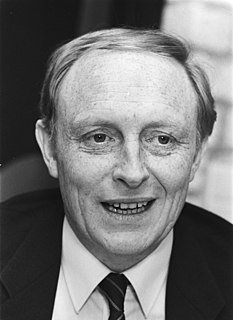
Neil Gordon Kinnock, Baron Kinnock, is a British former politician. As a member of the Labour Party, he served as a Member of Parliament from 1970 until 1995, first for Bedwellty and then for Islwyn. He was the Leader of the Labour Party and Leader of the Opposition from 1983 until 1992, and Vice-President of the European Commission from 1999 to 2004. Kinnock was considered as being on the soft left of the Labour Party.

Sir Edward Richard George Heath, often known as Ted Heath, was a British politician who served as Prime Minister of the United Kingdom from 1970 to 1974 and Leader of the Conservative Party from 1965 to 1975. Heath also served for 51 years as a Member of Parliament from 1950 to 2001. Outside of politics, Heath was a yachtsman, a musician, and an author.
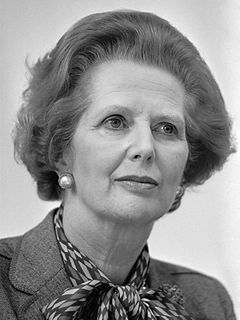
Thatcherism is a form of British conservative ideology named after Conservative Party leader Margaret Thatcher. The term has been used to describe the principles of the British government under Thatcher from the 1979 general election to her resignation in 1990, and continuing into the Conservative governments under John Major and David Cameron. Proponents of Thatcherism are referred to as Thatcherites.

John Smith was a British Labour Party politician who served as Leader of the Opposition and Leader of the Labour Party from July 1992 until his death from a heart attack in May 1994.
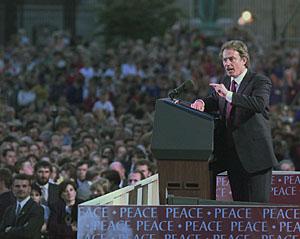
In British politics, Blairism is the political ideology of the former leader of the Labour Party and Prime Minister Tony Blair and those that follow him. It entered the New Penguin English Dictionary in 2000. Elements of the ideology include investment in public services, investment in education to encourage social mobility, and increased surveillance and law enforcement powers.
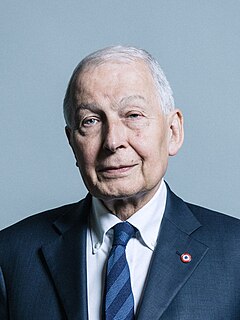
Frank Ernest Field, Baron Field of Birkenhead, is a British politician who was the Member of Parliament (MP) for Birkenhead for 40 years, from 1979 to 2019, serving as a Labour MP until August 2018 and thereafter as an Independent. In 2019, he formed the Birkenhead Social Justice Party and stood unsuccessfully as its sole candidate in the 2019 election. After leaving the House of Commons he was awarded a life peerage in 2020 and sits in the House of Lords as a crossbencher.
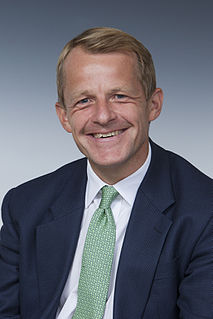
David Anthony Laws is a British Liberal Democrat politician. The Member of Parliament (MP) for Yeovil from 2001 to 2015, in his third parliament he served at the outset as a Cabinet Minister, in 2010, as Chief Secretary to the Treasury and later concurrently as Minister for Schools and for the Cabinet Office – an office where he worked cross-departmentally on implementing the coalition agreement in policies.
Peter Kilfoyle is a British Labour Party politician who was the Member of Parliament (MP) for Liverpool Walton from 1991 to 2010.

Arthur Christopher John Soames, Baron Soames, was a British Conservative politician who served as a European Commissioner and the last Governor of Southern Rhodesia. He was previously Member of Parliament (MP) for Bedford from 1950 to 1966. He held several government posts and attained Cabinet rank.
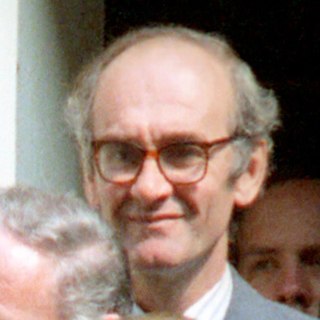
Sir John William Frederic Nott is a former British Conservative Party politician. He was a senior politician of the late 1970s and early 1980s, playing a prominent role as Secretary of State for Defence during the 1982 invasion of the Falkland Islands and subsequent Falklands War.

Iain Campbell Dale is a British broadcaster, author and political commentator, and a former publisher and book retailer. He has been a blogger since 2002. In 2005, he became the first openly gay Conservative candidate to contest a parliamentary election. He was the publisher of the magazine Total Politics between 2008 and 2012, and the managing director of Biteback Publishing until May 2018. Since September 2010, he has hosted a regular discussion show on the radio station LBC. He was named Radio Presenter of the Year at the Arqiva Commercial Radio Awards in both 2013 and 2016.
Stuart Weir is a British journalist, writer, and Visiting Professor with the Government Department at the University of Essex. He was previously the Director of the Democratic Audit, formerly a research unit of the University of Essex. Weir was a founder of the constitutional reform pressure group Charter 88, and was editor of the weekly political magazine the New Statesman from 1987–91, having previously been deputy editor of New Society, which merged with the New Statesman in 1988. Weir was editor of the Labour Party's monthly magazine New Socialist in the mid-1980s.
Stanley Clinton-Davis, Baron Clinton-Davis, PC is a British politician and former solicitor. A member of the Labour Party, he served as Member of Parliament (MP) for Hackney Central from 1970 to 1983, and was a minister in the Labour governments of Prime Ministers Harold Wilson, James Callaghan and Tony Blair. He was European Commissioner in the Delors Commission (1985–1989). In 1990, he became a Life Peer as Baron Clinton-Davis, of Hackney in the London Borough of Hackney, sitting on the Labour benches in the House of Lords until his retirement in 2018. He changed his name to Stanley Clinton-Davis by deed poll.

Academics, Members of Parliament, the general public and journalists alike have attempted to rank prime ministers of the United Kingdom and prime ministers of Great Britain. Those included below generally consist of only a subset of prime ministers, typically those of the 20th century or those who served after the Second World War.
Robert Waller is a British election expert, author, teacher, and former opinion pollster. His best known published work is The Almanac of British Politics, a guide to the voting patterns of all United Kingdom parliamentary constituencies.
Sir Peter Leslie Gibson, is a former British barrister and Lord Justice of Appeal of the Court of Appeal of England and Wales, and is currently a judge of the Qatar International Court. Gibson has also served, between April 2006 and December 2010, as the UK's Intelligence Services Commissioner, and was appointed by David Cameron in July 2010 to lead the Detainee Inquiry. He is an honorary member of the Society of Legal Scholars.
The Commissioner for Public Appointments is a British public servant, appointed by The Queen, whose primary role is to provide independent assurance that ministerial public appointments across the United Kingdom by HM Government Ministers are made in accordance with the Principles of Public Appointments and the Cabinet Office's Governance Code on Public Appointments. The Commissioner issues an annual report and a statistical bulletin each year.
This bibliography includes major books and articles about British prime minister Margaret Thatcher and her policies in office.
Conor Ryan is an Irish-born UK-based senior civil servant, independent writer and consultant, journalist, and adviser who is Director of External Relations at the Office for Students, a non-departmental public body of the Department for Education. He served as a special adviser and the senior education adviser to Secretary of State for Education and Employment David Blunkett from 1997 to 2001 and then to Prime Minister Tony Blair from 2005 to 2007.
References
- 1 2 3 "House of Commons - Appointment of the Commissioner for Public Appointments". parliament.uk. 13 April 2016. Retrieved 18 May 2021.
- 1 2 3 Iain Dale (12 May 2021). "Peter Riddell". globalplayer.com (Podcast). Iain Dale All Talk. Retrieved 18 May 2021.
- 1 2 Hansard Society - Advisory Council - Peter Riddell Archived 5 December 2010 at the Wayback Machine .
- ↑ Ben Dowell (18 June 2010). "Times political commentator Peter Riddell to quit paper after 19 years". guardian.co.uk. Retrieved 7 July 2010.
- 1 2 3 James Blitz and Alex Barke (6 July 2010). "Torture claims raise out-of-court deal prospect". Financial Times. Retrieved 7 July 2010.
- ↑ "Commissioner for Public Appointments appointed: Peter Riddell - Press releases - GOV.UK". www.gov.uk. Retrieved 30 April 2016.
- ↑ "British Academy President's Medal" (pdf). British Academy Review. No. 17. March 2011. pp. 13–14. Retrieved 23 July 2017.
- ↑ "No. 60173". The London Gazette (Supplement). 16 June 2012. p. 8.
- ↑ "No. 63571". The London Gazette (Supplement). 1 January 2022. p. N2.